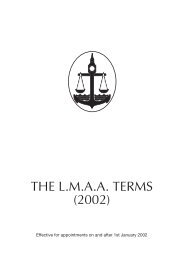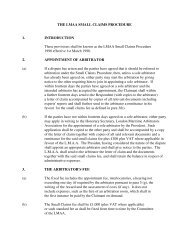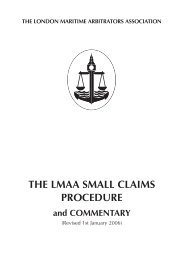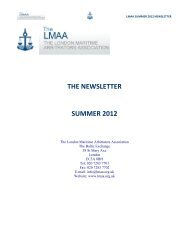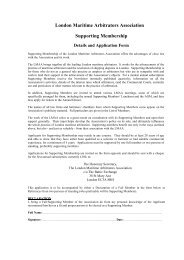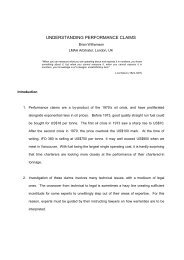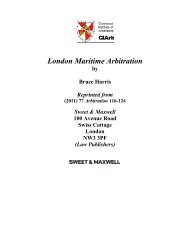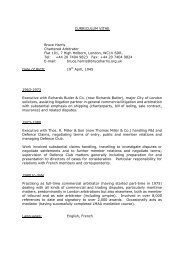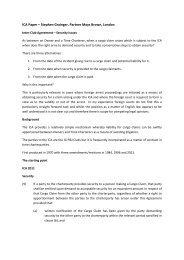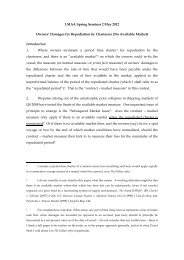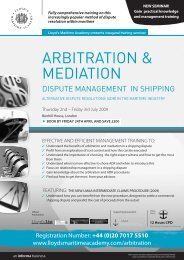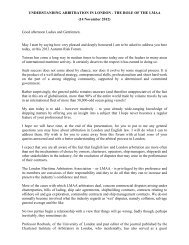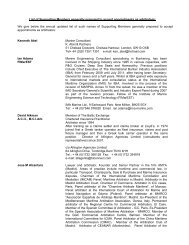Off Hire under the New York Produce form: âLoss of Timeâ & âTime ...
Off Hire under the New York Produce form: âLoss of Timeâ & âTime ...
Off Hire under the New York Produce form: âLoss of Timeâ & âTime ...
You also want an ePaper? Increase the reach of your titles
YUMPU automatically turns print PDFs into web optimized ePapers that Google loves.
8. In The A<strong>the</strong>na, <strong>the</strong>re could be no doubt that <strong>the</strong> Master’s refusal to sail toBenghazi prevented <strong>the</strong> full working <strong>of</strong> <strong>the</strong> ship and was within <strong>the</strong> list <strong>of</strong>specified causes (“default <strong>of</strong> master” had been added by <strong>the</strong> parties to <strong>the</strong>standard <strong>form</strong>). But had <strong>the</strong>re been “loss <strong>of</strong> time” from that cause and, if so, howmuch “time [was] <strong>the</strong>reby lost”?9. The arbitrators held that “… all [charterers] need to do … is demonstrate that <strong>the</strong>rewas … an immediate loss <strong>of</strong> time. On this last, we are satisfied that <strong>the</strong> consequence <strong>of</strong><strong>the</strong> Master’s failure to proceed directly to Benghazi was a loss <strong>of</strong> time by her delayedarrival at that port. … The time was lost in relation to <strong>the</strong> service immediately required<strong>of</strong> her and that is sufficient.” In o<strong>the</strong>r words, “loss <strong>of</strong> time” in clause 15 is loss <strong>of</strong>time in per<strong>form</strong>ing <strong>the</strong> service immediately required 3 . Since <strong>the</strong> “loss <strong>of</strong> time” inquestion was by way <strong>of</strong> total interruption in service (i.e. full non-working),<strong>the</strong>re was no partial service to be taken into account when working out “<strong>the</strong> time<strong>the</strong>reby lost”. This was not a case <strong>of</strong> partial interruption, or reduction, <strong>of</strong> <strong>the</strong>service (i.e. non-full working).10. The owners challenged <strong>the</strong> award, arguing that clause 15 required a ‘loss <strong>of</strong>time in per<strong>form</strong>ing <strong>the</strong> charter service overall’ or ‘loss <strong>of</strong> time to <strong>the</strong> adventureoverall’ (emphasis added). This concept <strong>of</strong> loss <strong>of</strong> time ‘overall’ was notprecisely defined, but appears to mean a net prolongation <strong>of</strong> <strong>the</strong> ship’s <strong>the</strong>ncurrent employment. Thus, in The A<strong>the</strong>na it was said <strong>the</strong>re was no ‘overall’ loss<strong>of</strong> time because <strong>the</strong> ship did not berth at Benghazi later than she would havedone without <strong>the</strong> drifting. But if delay ‘overall’ is what is required, equally itwould be absent (or reduced) where, but for <strong>the</strong> <strong>of</strong>f hire event, <strong>the</strong>re wouldhave been delay at a yet later stage, e.g. completing discharge, sailing fromBenghazi, arriving or berthing at <strong>the</strong> next load port <strong>under</strong> <strong>the</strong> time charter, etc.11. Walker J. allowed <strong>the</strong> owners’ appeal, concluding that <strong>the</strong>re was no “time<strong>the</strong>reby lost” and <strong>the</strong>refore no <strong>of</strong>f hire 4 . He was persuaded in particular by <strong>the</strong>3On that basis, <strong>the</strong> finding that arrival at Benghazi was delayed was not necessary: during<strong>the</strong> ‘drifting period’, <strong>the</strong> ship should have been making for Benghazi; she fully withheld her services,making no progress towards her ordered destination; <strong>the</strong>re was thus a full loss <strong>of</strong> service for 11 days.4Walker J.’s judgment is not as clear about this as it could have been, but we read him asagreeing (with <strong>the</strong> charterers and <strong>the</strong> arbitrators) that <strong>the</strong>re was a “loss <strong>of</strong> time”, but reasoning that<strong>the</strong>re was no “time <strong>the</strong>reby lost”. Hence, for example: his explanation at [27] <strong>of</strong> <strong>the</strong> <strong>form</strong>ulation <strong>of</strong> <strong>the</strong>question <strong>of</strong> law on which leave to appeal had been granted <strong>under</strong> <strong>the</strong> 1996 Act; his conclusion at[69]-[70] that The Berge Sund did not assist <strong>the</strong> charterers because “The only question which arose in [<strong>the</strong>3
easoning <strong>of</strong> Tuckey J. in The Ira [1995] 1 Lloyd’s Rep. 103. As appears below,we respectfully believe that reasoning to be unsatisfactory. But we turn first toolder authorities.12. We start with Hogarth v. Miller [1891] AC 48. The <strong>of</strong>f hire clause provided that,“In <strong>the</strong> event <strong>of</strong> loss <strong>of</strong> time from [various causes], whereby <strong>the</strong> working <strong>of</strong> <strong>the</strong> vessel isstopped for more than forty-eight consecutive hours, <strong>the</strong> payment <strong>of</strong> hire shall ceaseuntil she be again in an efficient state to resume her service.” (our emphasis). Thus,<strong>the</strong> clause required <strong>the</strong> charterer to demonstrate “loss <strong>of</strong> time”, and did so in away echoed by <strong>the</strong> first line <strong>of</strong> clause 15 <strong>of</strong> <strong>the</strong> <strong>New</strong> <strong>York</strong> <strong>Produce</strong> <strong>form</strong> 5 .13. The question that arises in The A<strong>the</strong>na was not addressed in terms (nor has itbeen since). However <strong>the</strong> House <strong>of</strong> Lords does seem to have assumed that anyinterruption to <strong>the</strong> efficient working <strong>of</strong> <strong>the</strong> ship would involve “loss <strong>of</strong> time”.Lord Halsbury, articulating <strong>the</strong> view <strong>of</strong> <strong>the</strong> majority, said at p.54, “The hirer <strong>of</strong><strong>the</strong> vessel wants to use <strong>the</strong> vessel for <strong>the</strong> purpose <strong>of</strong> <strong>the</strong> adventure and he iscontemplating <strong>the</strong> possibility that by some <strong>of</strong> <strong>the</strong> causes indicated in <strong>the</strong> clause itself…<strong>the</strong> efficient working <strong>of</strong> <strong>the</strong> vessel may be stopped, and so loss <strong>of</strong> time may be incurred;and he protects himself by saying, that during such period as <strong>the</strong> working <strong>of</strong> <strong>the</strong> vesselis stopped for more than forty-eight consecutive hours, payment shall cease.” (ouremphasis).14. This <strong>under</strong>standing <strong>of</strong> <strong>the</strong> House <strong>of</strong> Lords’ decision was also that <strong>of</strong> StaughtonL.J. in The Berge Sund [1993] 2 Lloyd’s Rep. 453, on which <strong>the</strong> arbitrators in TheA<strong>the</strong>na relied. Staughton L.J., having quoted from Hogarth, said at 459 rhc that:“… whe<strong>the</strong>r one is considering “loss <strong>of</strong> time”, or “preventing <strong>the</strong> efficient working <strong>of</strong><strong>the</strong> vessel” or “again in an efficient state”, [in] each case one has to decide whe<strong>the</strong>r [<strong>the</strong>ship] … was in <strong>the</strong> words <strong>of</strong> Lord Halsbury “efficient to do what she was required todo” by <strong>the</strong> charterers.”Berge Sund] was whe<strong>the</strong>r <strong>the</strong> <strong>of</strong>f-hire clause was engaged. … [It] had no concern whatever with <strong>the</strong>consequences <strong>of</strong> an <strong>of</strong>f-hire clause being engaged”; and his conclusion at [47]-[49] that Hogarth v. Millerdid not assist <strong>the</strong> charterers because, since <strong>the</strong> clause in that case was a period clause, “Nothing inwhat [Lord Halsbury] said involved any concept <strong>of</strong> net loss <strong>of</strong> time” (our emphasis).5Similarly, <strong>the</strong> clause in Tynedale Steamship Co v. Anglo-Soviet Shipping Co (1936) 54 Ll.L.Rep.341, 41 Com Cas 206 was this: “In <strong>the</strong> event <strong>of</strong> loss <strong>of</strong> time caused by [various causes] … preventing <strong>the</strong>working <strong>of</strong> <strong>the</strong> steamer and lasting more than 24 consecutive hours, hire to cease from commencement <strong>of</strong> suchloss <strong>of</strong> time until steamer is again in efficient state to resume service …”.4
Robert G<strong>of</strong>f J.’s explanation is that in a case <strong>of</strong> partial per<strong>form</strong>ance during <strong>the</strong>period <strong>of</strong> impaired working, <strong>the</strong> charterers do “escape [some] liability”, namelyliability for hire equivalent to <strong>the</strong> extent to which <strong>the</strong>y did not have full use <strong>of</strong><strong>the</strong> ship “for <strong>the</strong> services immediately required <strong>of</strong> her” during that period. On thatview <strong>of</strong> <strong>the</strong> clause, it does not operate by reference to ‘knock-on consequences’(whichever way <strong>the</strong>y fall out), only by reference to what was, or was not, beingdone during <strong>the</strong> period <strong>of</strong> operation <strong>of</strong> <strong>the</strong> <strong>of</strong>f hire cause: if due to that cause<strong>the</strong> charterers did not have <strong>the</strong> use <strong>of</strong> <strong>the</strong> ship for <strong>the</strong> service immediatelyrequired <strong>of</strong> her, she was <strong>of</strong>f hire. (The A<strong>the</strong>na is a case about ‘knock-onconsequences’, although what swayed Walker J. can be expressed as “had <strong>the</strong>ship not been drifting, she would have been idle somewhere else during that period”.Walker J. allowed that to affect <strong>the</strong> <strong>of</strong>f hire calculation because <strong>the</strong> time takenfor service later required <strong>of</strong> <strong>the</strong> ship was reduced by <strong>the</strong> late arrival thatresulted from <strong>the</strong> drifting. If <strong>the</strong> <strong>of</strong>f hire clause is concerned solely with <strong>the</strong>service immediately required, that should not be relevant.)19. Walker J. did not find <strong>the</strong> passage quoted above, or o<strong>the</strong>rs in The Pythia, helpfulto <strong>the</strong> charterers in The A<strong>the</strong>na. He concluded at [65] that Robert G<strong>of</strong>f J.’sanalysis “is not one which says that a net loss <strong>of</strong> time clause is concerned only with <strong>the</strong>service immediately required” and that “<strong>the</strong> facts in The Pythia did not require RobertG<strong>of</strong>f J to consider <strong>the</strong> question which arises in <strong>the</strong> present case”. The latter may betrue. But, in our view, <strong>the</strong>re is a focus in The Pythia upon <strong>the</strong> serviceimmediately required that did not stem from <strong>the</strong> particular question fordecision or <strong>the</strong> particular facts <strong>of</strong> <strong>the</strong> case. It stemmed from a perception that<strong>the</strong> subject matter <strong>of</strong> clause 15 was, exclusively, <strong>the</strong> delivery <strong>of</strong> <strong>the</strong> servicerequired at <strong>the</strong> time <strong>the</strong> ship’s working was impaired. If that is right, <strong>the</strong>n “<strong>the</strong>time <strong>the</strong>reby lost” naturally refers only to a quantification <strong>of</strong> that “loss <strong>of</strong> time” – itmeans simply “<strong>the</strong> amount <strong>of</strong> such lost time” 7 and not (as Walker J. has effectivelyconcluded) “<strong>the</strong> amount <strong>of</strong> delay overall resulting from such loss <strong>of</strong> time”. In short,<strong>the</strong> conclusion that <strong>the</strong>re was no <strong>of</strong>f hire in The A<strong>the</strong>na cannot be justified by <strong>the</strong>fact that clause 15 is a ‘net loss <strong>of</strong> time’ clause ra<strong>the</strong>r than a ‘period’ clause: thatconclusion is, in truth, a conclusion that <strong>the</strong>re was no “loss <strong>of</strong> time” at all, but<strong>the</strong>n, on <strong>the</strong> facts <strong>of</strong> The A<strong>the</strong>na, <strong>the</strong>re would equally have been no <strong>of</strong>f hire<strong>under</strong> <strong>the</strong> clause in Hogarth or Anglo-Soviet (paragraph 12 above).7or, more simply still, just “<strong>the</strong> time so lost”, as used in <strong>the</strong> second half <strong>of</strong> clause 156
correct 9 . Whe<strong>the</strong>r <strong>the</strong> Vogemann rule is correct – and if so, why – thus should<strong>form</strong> part <strong>of</strong> <strong>the</strong> debate in The A<strong>the</strong>na.22. Finally, as regards <strong>the</strong> authorities, we come to The Ira [1995] 1 Lloyd’s Rep. 103.The charter in that case was on <strong>the</strong> <strong>New</strong> <strong>York</strong> <strong>Produce</strong> <strong>form</strong>, so by clause 21 <strong>the</strong>ship was to be docked for bottom cleaning and painting (if required) at leastonce every six months and <strong>the</strong>n “payment <strong>of</strong> <strong>the</strong> hire to be suspended until she isagain in proper state for <strong>the</strong> service”. The parties agreed, pursuant to clause 21,that <strong>the</strong> ship was to be drydocked at Piraeus following a discharge operation<strong>under</strong> <strong>the</strong> charter at Ravenna. Clause 21 thus put her <strong>of</strong>f hire for <strong>the</strong> duration <strong>of</strong><strong>the</strong> drydocking. The charterers claimed she was also <strong>of</strong>f hire, <strong>under</strong> clause 15,for <strong>the</strong> duration <strong>of</strong> <strong>the</strong> voyage from Ravenna to Piraeus for <strong>the</strong> drydocking. Asit happened, <strong>the</strong> charterers’ next employment orders, given at <strong>the</strong> end <strong>of</strong> <strong>the</strong>drydocking, were for <strong>the</strong> ship to continue east towards Novorossiysk to load acargo.23. A sole arbitrator, and Tuckey J. on appeal, held that <strong>the</strong> ship was not <strong>of</strong>f hirebetween Ravenna and Piraeus. The reason for that put forward by <strong>the</strong> ownerswas that <strong>the</strong> time spent sailing to Piraeus was not, in <strong>the</strong> event, lost tocharterers, because Piraeus was en route between Ravenna and Novorossiysk.The result seems to us to have been right, but <strong>the</strong> reason given for it by <strong>the</strong>owners, and accepted by Tuckey J., seems, with respect, doubtful.24. A better explanation <strong>of</strong> The Ira as regards clause 15 is, we suggest, that <strong>the</strong> fullworking <strong>of</strong> <strong>the</strong> ship was never prevented:(1) Extracting just <strong>the</strong> words relied on by <strong>the</strong> charterers, <strong>the</strong> <strong>of</strong>f hireprovision invoked <strong>under</strong> clause 15 was that “In <strong>the</strong> event <strong>of</strong> <strong>the</strong> loss <strong>of</strong> timefrom drydocking preventing <strong>the</strong> full working <strong>of</strong> <strong>the</strong> vessel <strong>the</strong> payment <strong>of</strong> hireshall cease for <strong>the</strong> time <strong>the</strong>reby lost”.(2) The voyage from Ravenna to Piraeus was a consensual voyage. In thatcircumstance, in our view <strong>the</strong> service immediately required <strong>of</strong> <strong>the</strong> ship9We note that in <strong>New</strong> <strong>York</strong>, “loss <strong>of</strong> time” and “time <strong>the</strong>reby lost” are apparently taken to referto <strong>the</strong> net overall time lost to <strong>the</strong> charterers during <strong>the</strong> charter period, due to <strong>the</strong> <strong>of</strong>f hire cause thatoperated, and as a result it is thought that Vogemann would be decided <strong>the</strong> o<strong>the</strong>r way: see TimeCharters, 6 th Ed., para.25.91. That is consistent with <strong>the</strong> view that, on <strong>the</strong> language <strong>of</strong> clause 15, onecannot have both Vogemann and A<strong>the</strong>na (Walker J.).8
<strong>the</strong>reby lost” and “<strong>the</strong> time so lost” just different turns <strong>of</strong> phrase conveyinga single idea?(3) On <strong>the</strong> judge’s construction <strong>the</strong> only question is whe<strong>the</strong>r <strong>the</strong>re has beenprolongation to <strong>the</strong> voyage overall; however, in most or at least manycases, <strong>the</strong> charterer is unconcerned about whe<strong>the</strong>r <strong>the</strong>re is delay to <strong>the</strong>completion <strong>of</strong> a voyage – as long as he is able to earn demurrage in <strong>the</strong>meanwhile. Take <strong>the</strong> simpler example noted in paragraph 4 above: <strong>the</strong>ship, ordered to proceed to a discharge port, drifts at sea and so gets toport late; but <strong>the</strong>reby misses port congestion that would have kept herwaiting for a berth. Typically, <strong>the</strong> earlier arrival would have ensured(for time charterers) that time was running against sub-voyagecharterers or receivers. In Hogarth v Miller, Lord Halsbury explained <strong>the</strong>purpose <strong>of</strong> <strong>the</strong> <strong>of</strong>f hire clause in terms <strong>of</strong> <strong>the</strong> charterer’s desire to use <strong>the</strong>ship “for <strong>the</strong> purpose <strong>of</strong> <strong>the</strong> adventure” and his desire to protect himself ifhe does not get what he wants. If that is <strong>the</strong> notion in play, does anexclusive focus upon <strong>the</strong> provision (or failure to provide or partialprovision) <strong>of</strong> <strong>the</strong> service immediately required follow? 12(4) Under most time charters, hire is paid in advance (typically monthly orfortnightly) and <strong>of</strong>f hire during any one hire period is deducted from<strong>the</strong> next payment. On <strong>the</strong> arbitrators’ construction, it should be apparentwhe<strong>the</strong>r, during a particular period, <strong>the</strong>re was any <strong>of</strong>f hire deduction tobe made. On <strong>the</strong> judge’s construction, <strong>the</strong> parties cannot assess whe<strong>the</strong>r<strong>the</strong>re is a legitimate <strong>of</strong>f hire claim until <strong>the</strong> end <strong>of</strong> <strong>the</strong> “voyage overall”or <strong>the</strong> “adventure overall” (perhaps, indeed, until <strong>the</strong> end <strong>of</strong> <strong>the</strong> charterperiod). Does that have a bearing on how clause 15 should be read?(5) Finally, if Walker J’s construction is right, it will mean that clause 15 <strong>of</strong><strong>the</strong> <strong>New</strong> <strong>York</strong> <strong>Produce</strong> <strong>form</strong> has a different effect than clause 11(A) <strong>of</strong>12NB This is not to suggest, on any view, that whe<strong>the</strong>r a ship is <strong>of</strong>f hire in any particular casecan depend on <strong>the</strong> operation <strong>of</strong> voyage charters or sale arrangements ‘down <strong>the</strong> line’. The language<strong>of</strong> <strong>the</strong> <strong>of</strong>f hire clause does not refer to such matters and <strong>of</strong>f hire has always been seen as operatingmore or less mechanically. It is, however, to explain why it might be argued by charterers that <strong>the</strong>focus <strong>of</strong> <strong>the</strong> <strong>of</strong>f hire clause is on whe<strong>the</strong>r <strong>the</strong> ship is providing, from day to day, <strong>the</strong> service for whichhire is earned, ra<strong>the</strong>r than on some wider notion <strong>of</strong> delay.11
<strong>the</strong> Baltime <strong>form</strong> 13 and clause 21(a) <strong>of</strong> Shelltime 4 14 . We wonder whe<strong>the</strong>rthat will have been intended, but <strong>the</strong>n <strong>the</strong>re is different language in <strong>the</strong>three clauses, so how far can that ultimately take <strong>the</strong> debate?30. We close with this tester:-A ship is chartered on a <strong>New</strong> <strong>York</strong> <strong>Produce</strong> <strong>form</strong> charter. In mid-ocean en routeto a discharge port, her main engine breaks down without breach <strong>of</strong> contract.She is ‘dead in <strong>the</strong> water’ for 3 days, drifting. After that she proceeds, mainengine fixed, arriving at port 2 weeks later, and some 4 days after she wouldhave arrived without <strong>the</strong> breakdown (having, whilst without her main engine,drifted fur<strong>the</strong>r from her destination).She <strong>the</strong>reby misses port congestion that, had she arrived 4 days earlier, wouldhave kept her 2 days waiting for a berth.Under clause 15, was she <strong>of</strong>f hire for (i) 3 days, or (ii) 4 days, or (iii) 2 days?Discuss (we hope <strong>the</strong> Court <strong>of</strong> Appeal will).Terence CoghlinAndrew W Baker Q.C.Julian Kenny17 th May 201313Under clause 11(A) <strong>of</strong> <strong>the</strong> Baltime <strong>form</strong>, with “default <strong>of</strong> master” added, no hire would havebeen payable “in respect <strong>of</strong> any time lost <strong>the</strong>reby during <strong>the</strong> period in which [The A<strong>the</strong>na was] unable toper<strong>form</strong> <strong>the</strong> service immediately required”. The period in question was <strong>the</strong> drifting period, all <strong>of</strong> whichwas lost. The ship’s <strong>the</strong>n current employment was not prolonged because <strong>the</strong> time taken betweenarrival at Benghazi roads and berthing was reduced in consequence <strong>of</strong> <strong>the</strong> late arrival, not because<strong>the</strong>re was no time lost during <strong>the</strong> drifting period.14Under clause 21(a), paragraph (ii) <strong>of</strong> which would already cover <strong>the</strong> “default <strong>of</strong> master” in TheA<strong>the</strong>na, <strong>the</strong> ship would have been “<strong>of</strong>f-hire from <strong>the</strong> commencement <strong>of</strong> [<strong>the</strong>] loss <strong>of</strong> time until she is againready and in an efficient state to resume her service from a position not less favourable to Charterers than thatat which such loss <strong>of</strong> time commenced; provided, however, that any service given or distance made good …whilst <strong>of</strong>f-hire shall be taken into account in assessing <strong>the</strong> amount to be deducted from hire”. The <strong>of</strong>f-hireperiod, on that wording, would be <strong>the</strong> drifting period; and no service was given or distance madegood during that period.12



